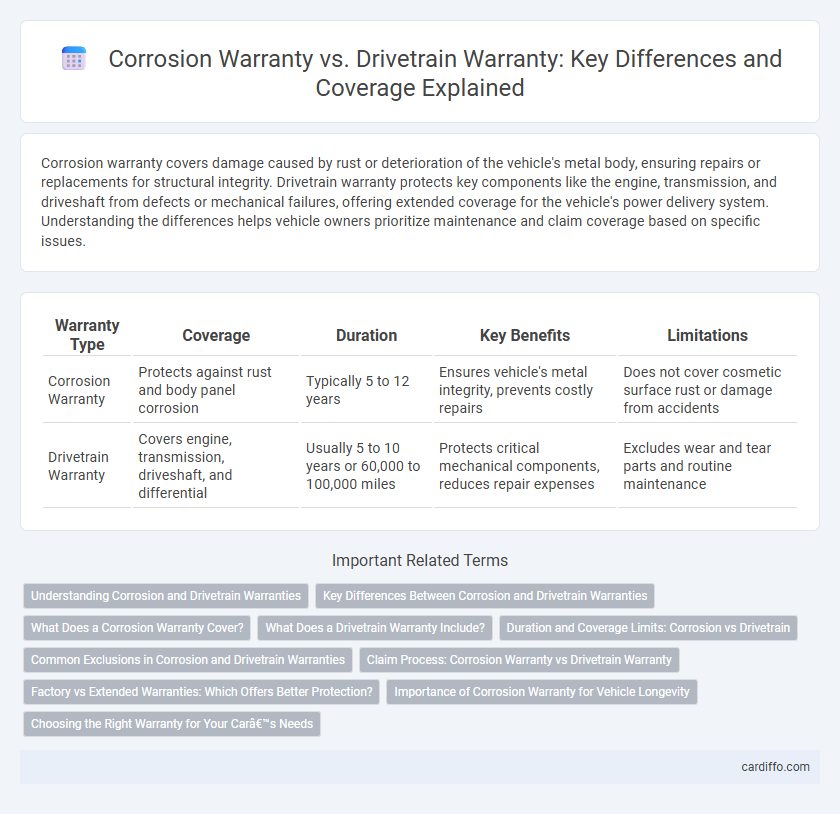Corrosion warranty covers damage caused by rust or deterioration of the vehicle's metal body, ensuring repairs or replacements for structural integrity. Drivetrain warranty protects key components like the engine, transmission, and driveshaft from defects or mechanical failures, offering extended coverage for the vehicle's power delivery system. Understanding the differences helps vehicle owners prioritize maintenance and claim coverage based on specific issues.
Table of Comparison
| Warranty Type | Coverage | Duration | Key Benefits | Limitations |
|---|---|---|---|---|
| Corrosion Warranty | Protects against rust and body panel corrosion | Typically 5 to 12 years | Ensures vehicle's metal integrity, prevents costly repairs | Does not cover cosmetic surface rust or damage from accidents |
| Drivetrain Warranty | Covers engine, transmission, driveshaft, and differential | Usually 5 to 10 years or 60,000 to 100,000 miles | Protects critical mechanical components, reduces repair expenses | Excludes wear and tear parts and routine maintenance |
Understanding Corrosion and Drivetrain Warranties
Corrosion warranties protect against rust and metal deterioration caused by environmental factors, typically covering a vehicle's body panels for a specific number of years or mileage. Drivetrain warranties focus on the components that deliver power to the wheels, including the engine, transmission, and driveshaft, ensuring repairs or replacements if these parts fail within the warranty period. Knowing the distinct coverage limits and conditions of corrosion and drivetrain warranties helps consumers make informed decisions about vehicle maintenance and potential repair costs.
Key Differences Between Corrosion and Drivetrain Warranties
Corrosion warranties specifically cover rust and corrosion damage on a vehicle's body panels, often lasting 5 to 12 years depending on the manufacturer. Drivetrain warranties focus on the engine, transmission, and related components, usually offering coverage between 5 to 10 years or up to 100,000 miles. The key difference lies in the areas covered: corrosion warranties protect against structural damage from rust, while drivetrain warranties cover mechanical failures affecting vehicle operation.
What Does a Corrosion Warranty Cover?
A Corrosion Warranty covers the repair or replacement of vehicle parts damaged due to rust or corrosion that penetrates the metal and compromises structural integrity. This warranty typically excludes surface rust or cosmetic blemishes, focusing instead on holes or significant metal deterioration caused by environmental factors like moisture, salt, and chemicals. Unlike a Drivetrain Warranty, which protects key mechanical components such as the engine and transmission, a Corrosion Warranty specifically addresses the longevity and safety of the vehicle's body and frame against corrosion-related damage.
What Does a Drivetrain Warranty Include?
A drivetrain warranty typically covers essential components such as the engine, transmission, driveshaft, and differential, protecting against mechanical failures that affect vehicle movement. It excludes wear-and-tear items like brakes or suspension parts and often lasts longer than a basic bumper-to-bumper warranty. Understanding the specific coverage details and duration of a drivetrain warranty is crucial for vehicle owners seeking long-term protection against costly repairs related to propulsion system failures.
Duration and Coverage Limits: Corrosion vs Drivetrain
Corrosion warranty typically covers rust and perforation issues for a period ranging from 5 to 12 years, depending on the manufacturer, while drivetrain warranties generally last between 5 and 10 years or a specific mileage limit, such as 60,000 to 100,000 miles. Coverage limits for corrosion warranties specifically address damage caused by rust penetrating the vehicle's metal surfaces, whereas drivetrain warranties protect major mechanical components like the engine, transmission, and axle assemblies. Consumers should note that corrosion warranties often exclude surface rust and focus on structural integrity, contrasting with drivetrain warranties that emphasize the performance and reliability of critical powertrain parts.
Common Exclusions in Corrosion and Drivetrain Warranties
Corrosion warranties commonly exclude damage from environmental factors like road salt, acid rain, and scratches or dents that expose metal surfaces, as well as wear from neglect or improper maintenance. Drivetrain warranties typically exclude failures caused by normal wear and tear, lack of regular maintenance, modifications, and damage from accidents or misuse. Understanding these exclusions helps consumers avoid unexpected repair costs related to corrosion and drivetrain components.
Claim Process: Corrosion Warranty vs Drivetrain Warranty
Corrosion warranty claims typically require detailed inspection reports and photographic evidence of rust or perforation, often involving a longer verification process due to environmental factors. Drivetrain warranty claims focus on mechanical component failures such as engine, transmission, and axle issues, usually necessitating diagnostic tests and service records for validation. Both warranties require submission through authorized dealerships, but corrosion claims may involve corrosion-specific labs or third-party assessors, whereas drivetrain claims prioritize certified repair centers.
Factory vs Extended Warranties: Which Offers Better Protection?
Factory corrosion warranties typically cover rust and perforation for up to 5 to 7 years with unlimited mileage, providing comprehensive protection against body damage caused by corrosion. Extended corrosion warranties often extend this coverage beyond factory terms but may include limitations, such as specific parts or conditions required for claims approval. Drivetrain warranties, whether factory or extended, focus on powertrain components like the engine and transmission, usually offering shorter durations than corrosion warranties but protecting against expensive mechanical failures.
Importance of Corrosion Warranty for Vehicle Longevity
Corrosion warranty plays a critical role in protecting a vehicle's structural integrity by covering rust and corrosion damages that can compromise safety and aesthetics over time. Unlike drivetrain warranty, which focuses on the engine, transmission, and related components, corrosion warranty ensures the vehicle's body panels and frame remain intact against environmental factors such as salt and moisture. Emphasizing corrosion warranty extends vehicle longevity by preventing premature deterioration and maintaining resale value.
Choosing the Right Warranty for Your Car’s Needs
Corrosion warranty covers rust and perforation damage typically lasting 5 to 12 years, protecting the car's exterior metal integrity. Drivetrain warranty focuses on the engine, transmission, and other essential mechanical components, often ranging from 3 to 10 years depending on the manufacturer. Selecting the right warranty depends on your vehicle's usage, climate exposure, and repair cost priorities to ensure comprehensive protection aligned with your driving conditions.
Corrosion Warranty vs Drivetrain Warranty Infographic

 cardiffo.com
cardiffo.com